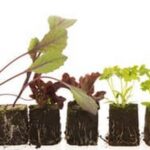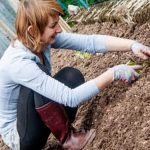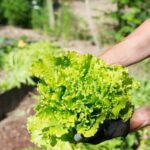Are landscape timbers safe for organic vegetable gardens? When it comes to cultivating organic produce, the choice of materials is crucial to maintaining a healthy and sustainable garden. In this article, we will explore the use of landscape timbers in organic vegetable gardens, addressing potential concerns and safety considerations.
Landscape timbers are commonly used for constructing raised beds in gardens due to their durability and ease of installation. However, it is essential to assess whether they are suitable for use in organic vegetable gardening, considering the principles of organic farming and the potential impact on soil health.
As we delve into this topic, we will examine the composition and uses of landscape timbers, as well as address any potential risks or drawbacks associated with their use in organic vegetable gardens. By understanding the importance of using safe materials in organic gardening, we can make informed decisions that align with sustainable practices and environmental stewardship.
What Are Landscape Timbers
Landscape timbers are a popular choice for building raised beds in organic vegetable gardens due to their affordability and natural appearance. These timbers are typically made from pressure-treated wood, such as pine or fir, which has been infused with chemical preservatives to increase its durability and resistance to decay. The most common preservative used in landscape timbers is chromated copper arsenate (CCA), although alternative treatments may also be available.
The primary use of landscape timbers is for creating borders and retaining walls, making them an attractive option for constructing raised beds in organic vegetable gardens. Their sturdy construction and easy installation make them a convenient choice for gardeners looking to establish defined growing areas without the need for extensive carpentry skills.
While landscape timbers offer numerous benefits for constructing raised beds, there are potential concerns regarding the use of pressure-treated wood in organic gardening. The chemical preservatives used in these timbers could potentially leach into the soil over time, posing a risk of contaminating the produce grown in the garden. Additionally, there is a risk of exposure to these chemicals during the handling and installation of landscape timbers.
Potential Concerns
When considering the use of landscape timbers in organic vegetable gardens, it is important to be aware of the potential concerns and drawbacks associated with these materials. While landscape timbers may seem like a convenient option for building raised beds, there are certain factors that should be taken into consideration before using them in organic gardening.
One potential concern with landscape timbers is the presence of chemicals or preservatives that may have been used in the treatment process. These chemicals can leach into the soil over time, posing a risk of contamination to the vegetables grown in the garden. Additionally, some landscape timbers may contain creosote, a substance commonly used to preserve wood, but which can be toxic to plants and detrimental to the overall health of the garden ecosystem.
Another drawback of using landscape timbers is their limited lifespan compared to alternative materials such as cedar or recycled plastic. Over time, landscape timbers are prone to decay and deterioration, which can result in the need for frequent replacement and maintenance. This not only adds extra cost and effort for gardeners but also raises concerns about sustainability and environmental impact.
Furthermore, there is a risk of physical injury associated with handling landscape timbers, especially if they are not properly secured or deteriorated. Splinters and sharp edges can pose a threat to gardeners during construction and maintenance activities. It is important to carefully consider these potential risks and drawbacks when deciding whether landscape timbers are suitable for use in an organic vegetable garden.
- Chemical leaching into soil
- Potential toxicity from preservatives
- Limited lifespan and need for replacement
- Risk of physical injury
Are Landscape Timbers Safe for Organic Vegetable Gardens
Landscape timbers are commonly used for building raised beds in organic vegetable gardens due to their affordability and ease of installation. These timbers are typically made from pressure-treated wood which has been treated with chemicals to resist rot and insect damage. However, there is concern about the potential leaching of these chemicals into the soil and affecting the safety of organic gardening.
One of the main components used in pressure-treated landscape timbers is chromated copper arsenate (CCA), a chemical mixture that includes arsenic, chromium, and copper. Studies have shown that these chemicals can leach from treated wood into the surrounding soil, potentially contaminating the area around the vegetable garden. This raises concerns about the safety of using landscape timbers in organic gardening, as it may compromise the integrity of organic produce.
In addition to the potential chemical leaching, there are also environmental considerations when using landscape timbers in organic vegetable gardens. The production and disposal of pressure-treated wood can have negative implications for both human health and ecosystems. It is important to consider these factors when deciding whether or not to use landscape timbers in organic gardening, and to explore alternative materials that may be safer and more environmentally friendly.
| Landscape Timber Concerns | Implications |
|---|---|
| Potential chemical leaching | Risk of contaminating soil and compromising organic produce |
| Environmental impact | Negative implications for human health and ecosystems |
Environmental Impact
Impact on Soil and Water Quality
When considering the use of landscape timbers in organic vegetable gardens, it is important to take into account the potential impact on soil and water quality. Landscape timbers are often treated with chemicals such as creosote, which can leach into the soil over time. This can potentially contaminate the soil and affect the health of plants grown in the garden.
Additionally, these chemicals can seep into the groundwater, posing a risk to water quality. It is crucial to consider these environmental implications when deciding whether to use landscape timbers in organic gardening.
Long-Term Environmental Effects
Another aspect to consider is the long-term environmental effects of using landscape timbers in organic gardening. While landscape timbers may provide a convenient and durable material for raised beds, their environmental impact should not be overlooked. Over time, treated landscape timbers may degrade and release harmful substances into the surrounding environment.
This can have detrimental effects on local ecosystems and wildlife. As stewards of the environment, it is important for organic gardeners to carefully weigh these long-term implications when making decisions about garden materials.
Sustainable Alternatives
Given the potential environmental impact of using landscape timbers in organic vegetable gardens, it is worthwhile to explore sustainable alternatives. There are various eco-friendly materials that can be used to construct raised beds, such as untreated cedar or recycled composite lumber.
These options offer durability without the use of harmful chemicals, thereby reducing the environmental impact of organic gardening practices. By choosing sustainable alternatives to landscape timbers, organic gardeners can minimize their ecological footprint while promoting a healthy and environmentally responsible approach to gardening.
Alternatives to Landscape Timbers
When it comes to building raised beds in organic vegetable gardens, landscape timbers are a popular choice due to their affordability and ease of use. However, there are concerns about the safety of using treated wood in organic gardening. Fortunately, there are alternative materials that can be used to construct raised beds while ensuring the safety and health of your organic garden.
One alternative to landscape timbers is untreated cedar or redwood. These types of wood are naturally resistant to decay and insect damage, making them a durable and long-lasting option for building raised beds. Additionally, cedar and redwood contain natural compounds that can help repel pests and fungi, further supporting the health of your organic garden.
Another eco-friendly option for constructing raised beds is composite lumber made from recycled materials. This material is not only environmentally friendly but also durable and low-maintenance. Composite lumber does not contain any harmful chemicals or toxins, making it a safe choice for organic vegetable gardens.
Recycled metal or galvanized steel can also be used as an alternative material for building raised beds in organic gardens. These materials provide excellent durability and are resistant to rot, pests, and decay. When using metal for raised beds, it’s important to line the interior with a barrier such as heavy-duty plastic to prevent leaching of any potential contaminants into the soil.
Overall, there are several alternatives to landscape timbers that can be used to construct safe and healthy raised beds in organic vegetable gardens. By carefully considering the materials you use, you can ensure that your garden remains free from harmful chemicals and toxins while promoting sustainable gardening practices.
| Alternative Material | Advantages |
|---|---|
| Untreated cedar or redwood | Naturally resistant to decay and pests; contains natural compounds that support plant health |
| Composite lumber | Made from recycled materials; durable; low-maintenance; free from harmful chemicals |
| Recycled metal/galvanized steel | Durable; resistant to rot, pests, and decay; lining with a barrier prevents leaching into the soil. |
Best Practices for Using Landscape Timbers
When using landscape timbers in organic gardening, it is essential to follow best practices to ensure the safety of the garden and its produce. By implementing proper techniques and strategies, gardeners can minimize potential risks and maximize the benefits of using landscape timbers in their organic vegetable gardens.
Choose Untreated Landscape Timbers
One of the key considerations for using landscape timbers in organic gardening is to select timbers that are free from chemical treatment. Untreated landscape timbers are preferable as they minimize the risk of harmful chemicals leaching into the soil and affecting the quality of the produce.
It is important to carefully check the labeling and specifications of landscape timbers to confirm that they have not been treated with preservatives or other chemicals that could compromise the organic nature of the garden.
Prepare the Site Properly
Before installing landscape timbers in an organic vegetable garden, it is important to prepare the site properly. This may involve clearing any existing vegetation, leveling the ground, and ensuring adequate drainage. By taking these steps, gardeners can create a stable foundation for their raised beds or retaining walls constructed from landscape timbers, reducing the risk of shifting or instability over time.
Maintain a Barrier Between Timber and Soil
To further safeguard against potential contamination from landscape timbers, it is recommended to maintain a barrier between the timber and the soil. This can be achieved by lining the inside of raised beds with landscaping fabric or another suitable material that prevents direct contact between the timber and the soil.
Additionally, regular monitoring should be performed to ensure that there are no signs of deterioration or damage to the timber that could compromise its safety for use in an organic vegetable garden. Following these best practices can help ensure that landscape timbers are used safely in organic gardening while minimizing any potential negative impact on soil quality and crop health.
Conclusion
In conclusion, the use of landscape timbers in organic vegetable gardens can raise concerns about potential chemical leaching and environmental impact. While landscape timbers are a popular choice for building raised beds due to their durability and affordability, organic gardeners should consider the potential risks associated with these materials. It is essential to prioritize safety and sustainability when choosing materials for organic gardening to ensure the health of both people and the environment.
To mitigate the potential concerns surrounding landscape timbers, organic gardeners may consider using alternatives such as untreated cedar or redwood, which are naturally resistant to decay and insect damage. Additionally, utilizing recycled plastic lumber or composite materials can provide a long-lasting and eco-friendly option for building raised beds in organic vegetable gardens. By carefully selecting safe and sustainable materials, organic gardeners can create productive and environmentally friendly growing spaces.
Ultimately, best practices for using landscape timbers in organic vegetable gardens involve careful consideration of the potential risks and taking steps to minimize them. This includes sealing the timbers with a non-toxic sealant, lining the interior with plastic sheeting to prevent direct contact with soil, and regularly monitoring for any signs of degradation or leaching. By following these guidelines, organic gardeners can maintain safe and healthy growing environments while using landscape timbers in their raised bed construction.
Frequently Asked Questions
Are Landscape Timbers Safe for Vegetable Gardens?
Landscape timbers are generally considered safe for vegetable gardens as long as they are not treated with any harmful chemicals. It’s important to use natural, untreated landscape timbers to avoid any potential leaching of chemicals into the soil and ultimately the vegetables.
Is Treated Timber Safe for Vegetables?
Treated timber, on the other hand, may not be safe for vegetables because it has been treated with chemicals that could potentially leach into the soil and harm the plants. These chemicals can include arsenic and other toxic substances that are not suitable for growing edible plants.
What Type of Wood Is Safe for Vegetable Garden?
When considering what type of wood is safe for a vegetable garden, it’s best to opt for naturally rot-resistant woods such as cedar, redwood, or cypress. These types of wood contain natural oils and tannins that resist decay and are unlikely to leach harmful chemicals into the soil.
Using these types of wood can help ensure a safe and healthy environment for growing vegetables.

If you’re looking to get into vegetable gardening, or are just looking for some tips on how to make your current garden better, then you’ve come to the right place! My name is Ethel and I have been gardening for years. In this blog, I’m going to share with you some of my best tips on how to create a successful vegetable garden.





